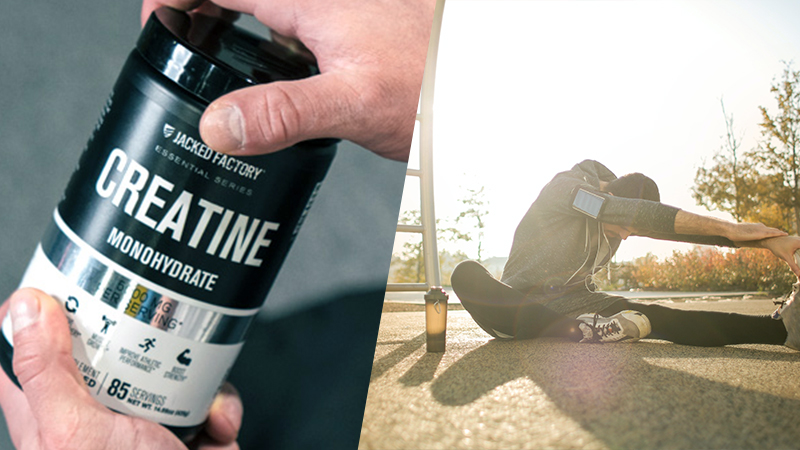The world of sports and fitness supplementation offers a multitude of options, and two of the most prominent choices are pre-workout supplements and creatine.
Understanding what is the difference between pre-workout and creatine is vital for anyone looking to optimize their training and performance.
In this introduction, we embark on an exploration of the fundamental differences between pre-workout supplements and creatine.
Pre-workout supplements are tailored to deliver an immediate energy boost, enhance workout focus, and increase endurance during training sessions.
These products are a blend of various ingredients, including caffeine, amino acids, and often other compounds aimed at stimulating physical and mental performance.
On the other hand, creatine is a single compound primarily focused on improving muscle strength, power, and endurance over a more extended period.
This differentiation in purpose, ingredients, timing, and effects sets the stage for a detailed analysis of how these supplements diverge and where they might complement each other.
What Is Creatine And What Does It Do?

Creatine is a naturally occurring compound found in small amounts in certain foods and synthesized within the human body, primarily in the liver, kidneys, and pancreas.
It plays a vital role in the body’s energy metabolism, especially during short bursts of intense physical activity.
Creatine is stored in the muscles in the form of creatine phosphate, which can quickly donate its phosphate group to adenosine diphosphate (ADP) to form adenosine triphosphate (ATP), the primary energy currency of cells.
When you engage in activities like weightlifting, sprinting, or high-intensity interval training, your muscles demand rapid energy production. This is where creatine steps in.
By replenishing ATP levels, creatine helps delay muscle fatigue and improves exercise performance. It’s particularly beneficial for enhancing strength, power, and muscle endurance, making it a popular and well-researched supplement among athletes and fitness enthusiasts.
Creatine supplementation is known to increase intramuscular creatine stores, leading to improved muscle function and performance.
It’s not just a performance enhancer, but it can also promote muscle growth, increase lean body mass, and potentially offer cognitive benefits.
As a versatile and safe supplement, creatine has become a staple in the fitness world, supporting a wide range of goals from improved athletic performance to enhanced body composition.
What Is The Difference Between Pre Workout And Creatine?
Here’s a chart highlighting the differences between pre-workout supplements and creatine:
| Aspect | Pre-Workout Supplements | Creatine |
| Composition | Contains various ingredients like caffeine, amino acids, vitamins, and sometimes creatine. | Consists primarily of creatine monohydrate, often in its pure form. |
| Purpose | Designed to provide energy, focus, and endurance for workouts. | Aims to enhance muscle strength, power, and endurance, with limited effects on immediate energy or focus. |
| Timing | Taken shortly before exercise, typically 15-30 minutes pre-workout. | Generally taken daily, with timing not closely tied to specific workouts. |
| Energy Boost | Provides an energy boost through caffeine and other stimulants. | Does not provide an immediate energy boost but enhances muscle performance over time. |
| Focus Enhancement | Contains ingredients like nootropics to improve mental focus. | Does not primarily target mental focus but can indirectly improve focus through enhanced performance. |
| Muscle Pump | Often includes ingredients like citrulline or arginine for muscle pump. | Lacks specific muscle pump ingredients but can indirectly enhance pump through increased strength and endurance. |
| Muscle Growth | May contain amino acids for muscle protein synthesis. | Supports muscle growth primarily by increasing workout performance and muscle recovery. |
| Recovery | Some pre-workouts have ingredients for post-workout recovery. | Does not specifically address post-workout recovery but can indirectly improve recovery by increasing workout performance. |
| Water Retention | Generally does not lead to water retention or bloating. | Can cause water retention in the muscles, potentially leading to a fuller appearance. |
| Taste and Flavor Options | Available in various flavors and forms (powder, liquid, capsules). | Typically available as unflavored powder or capsules. |
| Supplement Cost | Tends to be more expensive due to the diversity of ingredients. | Often more cost-effective, especially in its pure form. |
| Customization | Allows for customization by choosing specific pre-workout products with desired ingredients. | Provides fewer customization options as it primarily offers creatine in its pure form. |
Pre-workout supplements are designed to provide immediate energy, focus, and endurance for workouts and contain a variety of ingredients, while creatine primarily enhances muscle strength, power, and endurance over time.
The choice between the two depends on your fitness goals and preferences, as well as your tolerance for caffeine and other stimulants commonly found in pre-workouts.
Which Is Better: Creatine Or Pre-Workout?

The choice between creatine and pre-workout depends on your specific fitness goals, preferences, and tolerance for certain ingredients. Here are the key points to consider when determining which is better for you:
Goals and Priorities
If your primary goal is to enhance muscle strength, power, and endurance, creatine may be the better choice. It directly supports these aspects of performance over time.
On the other hand, if you’re seeking an immediate energy boost, improved focus, and endurance for workouts, pre-workout supplements are designed for this purpose.
Simplicity vs. Complexity
Creatine is straightforward, consisting of creatine monohydrate in its pure form. Pre-workouts, in contrast, contain a range of ingredients, often including caffeine, amino acids, and other compounds. Consider whether you prefer a simple or more complex supplement.
Caffeine Tolerance
Pre-workouts frequently contain caffeine, which provides an immediate energy boost. If you’re sensitive to caffeine or prefer to control your caffeine intake, creatine may be a better option, as it doesn’t contain stimulants.
Budget
Creatine is generally more cost-effective per serving compared to pre-workout supplements. If you’re on a budget, creatine offers value for your money while still providing significant benefits for strength and muscle gains.
Customization
Pre-workouts offer the advantage of customization. You can choose a product with specific ingredients that match your fitness goals. Creatine, on the other hand, provides fewer customization options, as it primarily offers creatine in its pure form.
Water Retention
Creatine can lead to mild water retention within muscle cells, which can give a fuller appearance. If you’re concerned about water retention or bloating, pre-workout supplements may be a better choice, as they typically do not cause water retention.
Long-Term vs. Immediate Effects
Creatine is known for its long-term benefits in enhancing muscle performance and strength. Pre-workouts provide immediate effects, making them suitable for quick energy boosts and workout focus. Consider whether you prioritize short-term or long-term results.
The choice between creatine and pre-workout depends on your specific fitness goals, preference for simple or complex supplements, caffeine tolerance, budget, need for customization, concerns about water retention, and whether you prioritize immediate or long-term effects.
Many individuals use both supplements at different times, incorporating creatine into their daily routine for its lasting benefits and using pre-workout for specific workouts or energy boosts.
FAQs
What is the primary difference between pre-workout and creatine supplements?
The primary difference lies in their purpose and composition. Pre-workout supplements are designed to provide an immediate energy boost, enhance focus, and improve workout endurance.
Creatine, on the other hand, primarily aims to enhance muscle strength, power, and endurance over time. It consists of creatine monohydrate or other forms of creatine.
Can pre-workout supplements be used as an alternative to creatine for muscle performance?
While pre-workouts offer an immediate energy boost, they don’t provide the same long-term muscle-strengthening effects as creatine. Creatine is more effective in enhancing muscle strength and endurance over an extended period, making it a better choice for this purpose.
Are pre-workout supplements and creatine mutually exclusive?
No, pre-workout supplements and creatine can complement each other. Some individuals use both, taking creatine daily for its long-term benefits and using pre-workout supplements before workouts for an immediate energy boost and focus.
Which supplement is cost-effective, pre-workout or creatine?
Creatine is generally more cost-effective per serving compared to pre-workout supplements. It offers significant benefits for muscle strength and endurance without the added costs of various ingredients found in pre-workouts.
Can creatine be a component of pre-workout supplements?
Yes, some pre-workout supplements include creatine as one of their ingredients. This combination aims to provide both immediate energy and long-term muscle performance benefits. However, these products may be more expensive due to the complexity of their formulation.
Conclusion
The differences between pre-workout supplements and creatine are significant and underscore the importance of aligning your supplementation choices with your specific fitness goals and preferences.
Pre-workout supplements excel in providing immediate energy and focus for workouts, making them ideal for individuals seeking a quick boost before exercise.
On the other hand, creatine primarily enhances muscle strength and endurance over time, making it a valuable choice for those with a long-term focus on performance improvement.
Ultimately, the decision between these two supplements hinges on your fitness goals, caffeine tolerance, budget, need for customization, concerns about water retention, and whether you prioritize short-term or long-term results.
Many individuals even incorporate both into their supplementation routines, leveraging the immediate benefits of pre-workouts and the sustained performance enhancements of creatine.
Understanding these differences empowers individuals to make informed choices and tailor their supplement regimen to their unique needs.
Hi, I’m Mark Pattinson and I’m a freelance personal trainer. I’ve been working in the fitness industry for over 10 years especially since I work with diabetes patients and I love helping people achieve their fitness goals. I believe that everyone can benefit from a good workout, and I’ll do everything to make sure you get the most out of your training.